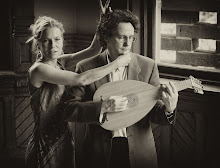
Here is the program and notes for Saturday's concert at Heliconian Hall. Click on the link for location etc. The picture above is by Gerard ter Borch. It's possible there may be one or two changes.
Songs for Anne Greene by John Danyel (1564-c1626)
Coy Daphne fled/Chast Daphne fled
Eyes looke no more
Let not Cloris thinke
Lute Lessons from Margaret Board’s Lute Book
Delyght Pavin John Johnson (d. 1594)
Delght Gallyard John Johnson
The Lady Phillyes Mask Anon.
I cannot keepe my wyfe at howme Anon.
Songs for Anne Greene by John Danyel
Time cruell Time
Thou prety Bird
Like as the Lute
Ann Twice Her Book
O let us howle some heavy note Robert Johnson (c1583-c1634)
Have you seen the bright lily grow Robert Johnson
Intermission
Eliz. Davenant Her book
Have you seen but a bright lily grow Robert Johnson
Woods rocks and mountains Robert Johnson
Songs for the Egerton Sisters by Henry Lawes (1595-1622)
Sweet stay awhile
Sweet Echo
To a Lady, singing the former Song
Lute Lessons from Margaret Board’s Lute Book
Midnight John Dowland (1563-1626)
Solus cum sola Dowland
Lady Banning her Almand John Stuart (d. 1625?)
Songs for the Egerton Sisters by Henry Lawes
The Rose
To a Lady, more affable since the War began
Tavola - In quel gelato core
The Musicians in Ordinary
Named after the singers and lutenists who performed in the most intimate quarters of the Stuart monarchs’ palace, The Musicians In Ordinary for the Lutes and Voices dedicate themselves to the performance of early solo song and vocal chamber music. Soprano Hallie Fishel and lutenist John Edwards have been described as ‘winning performers of winning music’. This is their 10th anniversary season of concerts in Toronto, and they concertize and lecture regularly at universities and museums across North America.
Before the Restoration, the English stage, was not a place where the educated woman was permitted to exercise the skills she had acquired in the sister arts of rhetoric and music. The more intimate and controlable domestic performance space, however was her’s to command.
John Danyel was the brother of the poet and playwright Samuel, who is the author of the lyrics ‘Lyke as the Lute’ and ‘Time cruell Time.’ John Danyel’s Songs for the Lute, Viol and Voice of 1606 is dedicated to Mistress Anne Greene, the daughter of a wealthy if not particualrly well-pedigreed knight, Sir William Greene. Danyel worked as a household musician for the Greene family. A few lines from his verse dedication will make clear the function of the songs in the collection.
To Mrs. Anne Grene…
That which was onely privately composed,
For your delight, Faire Ornament of Worth,
Is here, come to bee publikely disclosed:
And to an universall view put forth.
These songs, then, were written for Anne to enjoy, and probably sing in her lessons with Danyel.
Before he was engaged at court, Henry Lawes also worked as a household musician, for the more illustrious Egerton family. His duties included teaching the daughters of John Egerton, the Earl of Bridgewater, to sing. Lawes’ dedicated his Ayres and Dialogues of 1658 is to Alice and Mary Egerton, by then Countess of Carbery and Lady Herbert of Cherbury. The dedication says of the songs ‘most of them were composed when I was employed to attend to your Ladishipp’s education in musick’, that is, some 30 years earlier. Lady Alice performed and sang in Milton’s Comus, for which Lawes wrote the music. Since ‘Sweet stay awhile’ preceeds the songs Lawes wrote for that masque in Lawes’ autograph songbook, we can presume it was written when he was still teaching the girls.
While young women were not allowed to perform on the public stage in this period, we can be sure that they wanted to sing the latest stage hits at home if the contents of the songbooks written out by Ann Twice and Elizabeth Davenant are anything to go by. From Ben Jonson’s The Devil is an Ass we hear the song ‘Have you seen the bright lily grow’, and from John Webster’s The Duchess of Malfi we present the dramatic ‘O let us howle.’
Margaret Board appears to have taken some lessons from John Dowland about 1620. By this time Dowland was complaining about the new musicians at court. Perhaps he assigned Margaret the pieces in here book by long dead composers like John Johnson, while she filled in the gaps with the latest masque and ballad tunes.




